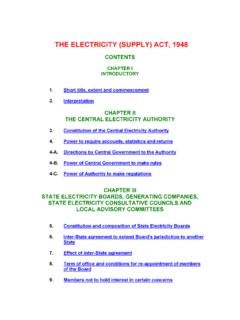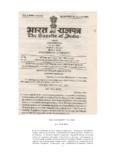Transcription of Tamil Nadu Tax on Consumption or Sale of Electricity Act, …
1 Tamil nadu Tax on Consumption or Sale of Electricity Act, 2003 1. (1) This Act may be called the Tamil nadu Tax on Consumption or Sale of Electricity Act, 2003. (2) It shall come into force on such date as the State Government may, by notification, appoint. Short title and commencement. Central Act 1 of 1956 Central Act X of 1910. 2. In this Act, unless the context otherwise requires,- (1) "actual user of power" means one who is not a consumer but uses power out of captive generating plant; (2) "captive generating plant" means a power plant set up by any person or association of persons or any Co-operative society to generate Electricity primarily for his own use or for the use of members, and includes the power plants that are permitted to sell the surplus power so generated.
2 (3) "Director" means the Director of Electricity Tax appointed by the State Government ; (4) "company" means a company registered under the Companies Act, 1956 and includes anybody Corporate under a Central, State or Provincial Act. (5) "consumer" with its grammatical variations and cognate expression means any person who is supplied with Electricity on payment of charges, or free of cost or otherwise by a licensee or by the Government or by any other person engaged in the business of supplying Electricity to the public under the Indian Electricity Act, 1910 or any other law for the time being in force and includes - (i) a licensee who consumes Electricity whether generated by himself or supplied to him by any other licensee.
3 And (ii) actual user of power or any other person who consumes Electricity generated by himself; Explanation Where a licensee consumes Electricity , whether generated by himself or supplied to him, such licensee shall be deemed to be a consumer only in respect of the Electricity so consumed. Explanation Where a licensee or other person consumes energy for purposes connected with the construction, maintenance and operation of the generating transmitting and distributing system, such licensee or person shall not be deemed to be a consumer in respect Definitions Central Act X of 1910.
4 Central Act LIV of 1948. Tamil nadu Act V of 1920 Tamil nadu Act 21 of 1994 Central Act X of 1910. Central Act LIV of the energy so consumed; (6) " Electricity " means electrical energy ; (7) "energy charge" means the amount charged (whether as energy charge or other charge) by a licensee for the supply of Electricity to a consumer before deduction of rebate, if any, allowed by the licensee for payment on or before such date as may be specified by the licensee, but does not include - (i) meter charges; (ii) interest on delayed payment ; (iii) fuel surcharge.
5 Or (iv) fuse off call charges and reconnection charges Explanation - If Electricity is supplied to any person free of charge or at a concessional rate (other than tariff concession), the energy charge would mean the tariff fixed by the Tamil nadu Electricity Regulatory Commission in its Tariff Order to similar consumer. Explanation - "other charge" shall include demand charge and power factor surcharge. (8) "gross charge" means the aggregate amount of energy charge, fuel surcharge and other charges, if any, made by the licensee for the supply of Electricity ; (9) "generating company" means any company or body corporate or association or body of individuals, whether incorporated or not or artificial juridical person, which owns or operates or maintains a generating station.
6 (10) "licensee" means any person licensed under part II of the Indian Electricity Act, 1910, to supply Electricity and includes any person who has obtained the sanction of the State Government under section 28 of that Act, the State Government when it is engaged in the business of supplying Electricity , the generating company as defined in clause (4-A) of section 2 of the Electricity (Supply) Act, 1948, the Electricity Board and the captive generating plant; (11) "local authority" means- (i) any Municipal Corporation established under any law for the time being in force; or (ii) any Municipal Council constituted under the Tamil nadu District Municipalities Act, 1920; or (iii) any District Panchayat or any Panchayat Union Council or any Village Panchayat constituted under the Tamil nadu Panchayats Act, of 1948.
7 Central Act 14 of 1998 1994; (12) "net charge" means the amount of gross charge that remains after deduction there from of any rebate referred to in clause (7) of this section or refund of fuel surcharge or other charges, if any. (13) "supply" in relation to Electricity means the sale of Electricity to a licensee or consumer. (14) "tariff" means a rate of tariff livable upon the Consumption of Electricity in the State supplied by the licensee and as fixed by the Tamil nadu Electricity Regulatory Commission ; (15) "unit" means one kilowatt hours of energy.
8 (16) words and expressions used but not defined in this Act shall have the meaning assigned to them in the Indian Electricity Act,1910, Electricity (Supply) Act, 1948 and the Electricity Regulatory Commission Act, 1998. 3. (1) Save as otherwise provided in this Act, every licensee and every person other than a licensee shall pay every month to the Government in the prescribed manner, a tax on the Electricity sold or consumed during the previous month at the rates specified hereunder: (a) In the case of licensees other than captive generating plants, the rate shall be not less than 5% and not more than 10% of the net charge, as may be notified by the Government.
9 Provided that no tax shall be paid on sale of Electricity for agricultural purposes and hut service connections; (b) In the case of licensees who are captive generating plants, the rate shall be not less than 10 paise and not more than 20 paise per unit of Electricity on the Consumption for own use; and shall be not less than 5% and not more than 10% on the net charge on the sale of surplus Electricity as may be notified by the Government ; Provided that no tax shall be paid on the sale of Electricity to the Board. (c) In the case of a person other than a licensee, the rate shall be not less than 10 paise and not more than 20 paise per unit of Electricity on the Consumption for own use as may be notified by the Government ; (2 ) The Government may pay such amount as may be prescribed as collection charge to every person collecting Electricity tax under this section.
10 Provided that such amount shall not exceed one percent of the Electricity tax collected by such person. Tax on the Consumption or sale of Electricity 4. Notwithstanding anything contained in this Act, no Electricity tax Electricity sold for Central Act 24 of 1989. shall be payable under section 3, on the sale of Electricity , by a licensee to - (a) any Government for Consumption by that Government , save in respect of premises used for residential purposes; (b) (i) any local authority, save in respect of premises used for residential purposes; (ii) Railway administration as defined in the Railways Act, 1989, save in respect of premises used for residential purposes.






